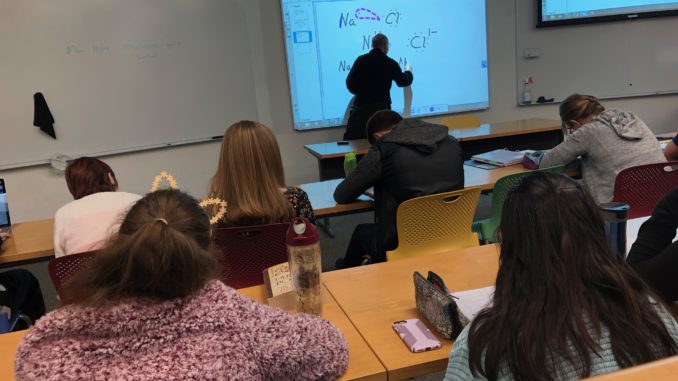
Truman State University’s decline in enrollment has impacted academic departments, forcing some to make internal changes and create new marketing strategies.
The lower number of incoming freshman for the 2019-20 academic year has created a more challenging prediction for enrollment in courses and caused the University and academic departments to find new ways to promote themselves. Tyana Lange, vice president for enrollment management and marketing, said Truman has seen a steady decline in enrollment for the past few years. In 2017, the number of incoming freshmen was 1,328, which has been the highest amount in recent years. This year that number was 898. The goal for the 2020-21 academic year is 1,075.
Lange said applications are trending with where they were three years ago, but people should not expect the same amount of incoming freshmen as before.
“I’m optimistic about the future but don’t want to set an expectation that we’re going to blink and it be back to the way it used to be,” Lange said.
Janet Gooch, vice president for academic affairs and provost, said the departments that provide courses fulfilling the Liberal Studies Program are the ones that have had the most trouble predicting course numbers.
She said despite the lower number of students, there are still programs, such as nursing, that have not been affected. The number of applicants to that program are greater than what the department can accomodate for.
Mary Shapiro, English and linguistics department chair and professor of linguistics, said the amount of class sections the English and linguistics department offered this year was reduced because of lower enrollment. This mainly impacted the LSP classes the department provides, such as Writing as Critical Thinking.
Shapiro said the department keeps writing classes smaller because students typically need more one-on-one attention with these types of classes, and if too many of these sections are reduced, class sizes increase.
Overall, the number of English majors decreased, but creative writing and linguistic majors have not seen a significant difference because those declared majors are traditionally smaller, Shapiro said.
Gooch said departments across campus looked into their curriculum this year to see if they can adjust class scheduling and change certain classes from being offered every semester to every other semester, or yearly to biyearly.
Other ways departments are changing their curriculum include adding courses that are more appealing to students and updating course descriptions, Gooch said.
The University as a whole has responded to the decrease in enrollment and most understand the consequences and are doing what they can to fix it, Gooch said.
As a result of lower enrollment numbers, Truman has undergone marketing and admission changes. Lange said the Admissions Office is implementing three things to promote campus. The first strategy is flipping the idea of value and excellence. She said talking about excellence before value will create a new conversation with people. Talking about excellence, opportunities available and describing how incredible the institution will increase the value even more, Lange said.
The second strategy the Admissions Office is executing is that they are done apologizing for Kirksville.
“Kirksville is an amazing city. We want people to know that it is an amazing city [and] that we have an amazing relationship between the University and the town,” Lange said. “While there may not be the things to do that you can do in St. Louis and Kansas City, I guarantee you that there are things you can do in Kirksville that you cannot do in those places, and we want to really focus and emphasize that.”
The third strategy from the Admissions Office is removing the term “highly selective” from their recruitment vocabulary. This will not change the admission standards, but they have found that there are a lot of students that would have thrived at Truman but did not apply because of the term “highly selective,” Lange said.
Truman is looking at a new branding guide that will be coming at the end of the year, and the University will be working with SME Investments, LLC. The launch date is coming up in the next couple of months, Lange said.
The English and linguistics department is marketing themselves in various ways. Some of their strategies include giving out bookmarks with all of the faculty members on them, having a social media presence on Twitter and talking to current and prospective students about completing a bachelor’s and master’s in English in five years.
Shapiro said she has a hard time understanding why people wouldn’t want to come to Truman.
“I really feel like Truman is a special place. It’s not just that it’s smaller and you get to know your professors, although I think that is a huge part of it,” Shapiro said. “It’s sort of what you think of when you think of a college experience.”
Truman is working on adding a few courses to the Master’s of Mental Health Counseling program, which will be online. Another online program includes the Data Science Certificate. Gooch said these will attract a whole new set of students to the University.
The biggest challenge with marketing the University is it being called and thought of as a hidden gem, Lange said. As time progresses, marketing efforts from competing universities have increased.
“My challenge now is to take these humble groups of folks who have been Truman forever and convince them that it’s okay to shout from the mountain tops how great we are,” Lange said.
